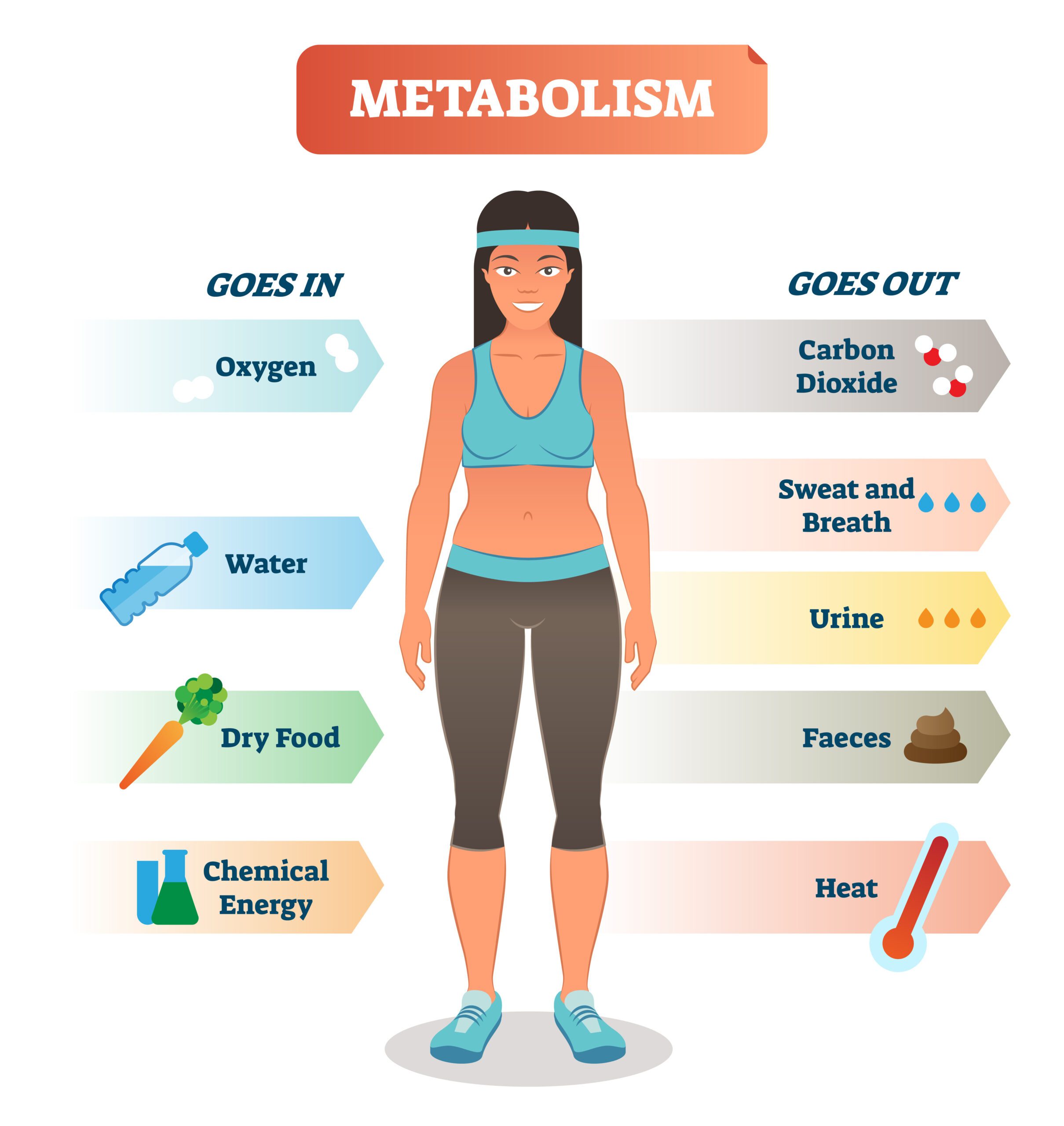How Calorie Restriction/Starvation Diets Actually Cause Weight Gain
November 1, 2023
 759
759 
When it comes to losing weight, many people turn to calorie restriction and starvation diets as a quick solution.
The idea is simple: consume fewer calories than you burn, and you will shed those extra pounds.
While this approach may seem logical, it’s a common misconception that can have the opposite effect on your weight loss journey.
Instead of helping you reach your goals, calorie restriction and starvation diets can actually contribute to weight gain.
In this blog post, we will explore the reasons why these diets are counterproductive and delve into the science behind metabolism and its crucial role in weight loss.
Our aim is to provide you with the knowledge you need to make informed decisions about your diet and achieve sustainable weight loss.
Understanding metabolism and its role in weight loss

Metabolism refers to the complex process by which our bodies convert the food we eat into energy.
This energy is essential for carrying out various functions, from breathing and circulating blood to growing and repairing cells.
In simple terms, metabolism is the engine that keeps our bodies running.
The rate at which our bodies burn calories is known as the metabolic rate.
This rate can vary from person to person and is influenced by factors such as age, gender, and genetics.
A faster metabolic rate means that your body burns calories more efficiently, which can be beneficial for weight loss.
The relationship between metabolism and weight loss is straightforward: the more efficiently your body burns calories, the easier it is to lose weight.
Conversely, if your metabolism is slow, losing weight can be more challenging.
This is where the problems with calorie restriction and starvation diets come into play, as these approaches can significantly impact your metabolic rate.
In the following sections, we will delve deeper into this topic and explore the consequences of slowing down your metabolism through restrictive diets.
The Impact of Calorie Restriction on Metabolism

When we restrict our calorie intake, our body goes into survival mode.
It’s a natural response that has helped humans survive during times of famine. To conserve energy, the body reduces the number of calories it burns, effectively slowing down the metabolism.
The consequences of a slower metabolism are far-reaching and can significantly impact your weight loss efforts.
With a reduced metabolic rate, you may find that you are not losing weight as quickly as you expected, despite eating less.
This can be frustrating and demotivating, leading many to abandon their weight loss efforts altogether. Furthermore, a slower metabolism can result in muscle loss, as the body starts to break down muscle tissue for energy.
This is detrimental to your overall health and fitness, as muscle tissue is essential for maintaining strength and vitality.
The Dangers of Starvation Diets

Starvation diets are extreme forms of calorie restriction that involve consuming very few calories, often less than 800 per day.
These diets are dangerous and can have severe consequences for your health and weight.
When you deprive your body of the nutrients it needs, it responds by slowing down the metabolism to conserve energy.
This is similar to the body’s response to calorie restriction, but the effects are more severe due to the extreme nature of starvation diets.
The negative effects of a slowed metabolism are compounded by the lack of essential nutrients, which can result in fatigue, weakness, and other health problems.
In the long term, starvation diets can lead to serious health complications, such as malnutrition, electrolyte imbalances, and heart problems.
Furthermore, these diets are unsustainable and often result in rapid weight gain once normal eating patterns are resumed.
This yo-yo effect can be detrimental to your health and make it even harder to achieve sustainable weight loss.
In conclusion, starvation diets are not a safe or effective way to lose weight and should be avoided at all costs.
Alternative Approaches to Weight Loss: The Potential of Varins and THCV

While calorie restriction and starvation diets can be counterproductive to your weight loss efforts, there are alternative approaches that can be more effective and sustainable.
One of these alternatives is the use of varin cannabinoids, such as THCV (tetrahydrocannabivarin), to promote natural weight loss.
A. Definition of Varin Cannabinoids and THCV
Varin cannabinoids are a type of compound found in the cannabis plant. THCV is one of the most well-known varin cannabinoids and has gained popularity for its potential health benefits.
B. How THCV Works in the Body
THCV interacts with the body’s endocannabinoid system, which plays a crucial role in regulating various physiological processes, including appetite, mood, and metabolism.
THCV has been shown to have a different effect on the body compared to other cannabinoids, such as THC, which is responsible for the “high” associated with cannabis.
C. The Potential Benefits of THCV for Weight Loss
D. The Current State of Research on THCV and Weight Loss
While the potential benefits of THCV for weight loss are promising, it’s important to note that research in this area is still ongoing.
More studies are needed to fully understand how THCV works in the body and to determine the most effective dosage and method of administration for weight loss.
E. How to Safely Incorporate THCV into a Weight Loss Plan
If you are considering using THCV as part of your weight loss plan, it’s important to consult with a healthcare professional or registered dietitian first.
They can help you to determine if THCV is suitable for you and provide guidance on how to incorporate it into your diet and lifestyle safely.
Conclusion
In summary, calorie restriction and starvation diets may seem like a quick fix for weight loss, but they can have the opposite effect, ultimately contributing to weight gain. By slowing down your metabolism and depriving your body of essential nutrients, these diets can be detrimental to your overall health and wellbeing.
Rather than resorting to extreme and unsustainable methods, it is important to adopt healthy and sustainable weight loss strategies. One promising alternative is the use of varin cannabinoids, such as THCV, which has been shown to have potential benefits for weight loss, including appetite suppression, increased energy expenditure, and improved metabolism.
As you navigate your weight loss journey, it is crucial to consult with a healthcare professional or registered dietitian. They can provide personalized advice and guidance to help you achieve your weight loss goals safely and effectively.
Remember, the key to successful weight loss is not about depriving yourself, but about finding a balanced and sustainable approach that works for you.

A new study suggests that a widely used sugar substitute found in diet sodas, chewing gum, and low-sugar yogurt may elevate insulin levels. This could increase the long-term risk of heart disease. “Artificial sweeteners have infiltrated nearly all types of food, making it crucial to understand their long-term health effects,” said Yihai Cao, senior author […]

Diet Coke has long been a fan-favorite among soda lovers who want a fizzy, guilt-free alternative to traditional soft drinks. While its zero-calorie, zero-sugar label makes it seem like a healthier option, the reality is far more concerning. Despite its undeniable popularity, Diet Coke’s nutritional profile has raised red flags among health experts for years. […]

New study shows that embracing an anti-inflammatory, plant-forward diet can support cognitive function and help reduce the risk of dementia. What You Eat Shapes Your Brain The food you eat doesn’t just impact your body—it also affects your brain. Research suggests that eating an anti-inflammatory, plant-based diet can help improve memory, focus, and overall brain […]